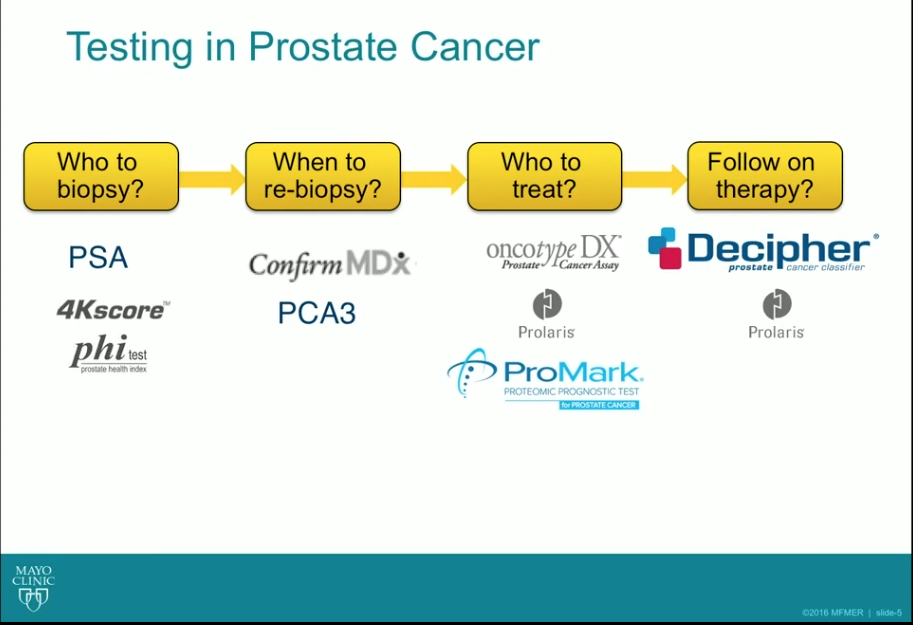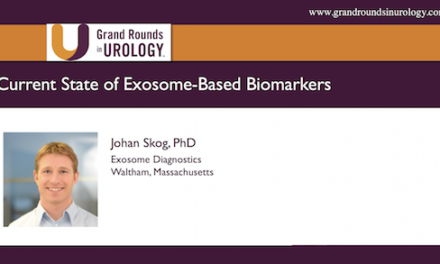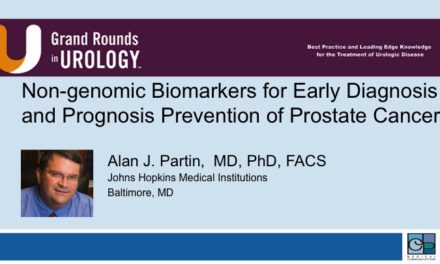Alan H. Bryce MD, presented “Biomarkers in Localized Prostate Cancer: Sure You Can, But Why Would You?” during the 27th Annual Perspectives in Urology: Point Counterpoint on November 9, 2018 in Scottsdale, Arizona.
How to cite: Bryce, Alan H. “Biomarkers in Localized Prostate Cancer: Sure You Can, But Why Would You?” November 9, 2018. Accessed Dec 2024. https://dev.grandroundsinurology.com/biomarkers-in-localized-prostate-cancer-sure-you-can-but-why-would-you/
Biomarkers in Localized Prostate Cancer: Sure You Can, But Why Would You? Summary:
Alan H. Bryce, MD, discusses the role of biomarkers in clinical decision-making for localized prostate cancer. He argues that while currently available assays have demonstrated predictive ability, prospective data remains insufficient to determine whether or not they improve clinically meaningful endpoints.
This presentation is part of a Point-Counterpoint debate. Watch the rebuttal: “There is a Role for Currently Available Biomarkers: Genomics in the Risk Stratification of Prostate Cancer” by Timothy C. Brand, MD.
Abstract:
Decision-making in the management of localized prostate cancer remains complex. Patients and practitioners struggle with decisions regarding biopsy versus surveillance, surveillance versus treatment, and adjuvant radiation therapy versus ongoing observation. Clinical risk calculators have proven imperfect.
A variety of commercially available genomic testing platforms are currently available to help in the decision-making process. These assays have demonstrated ability to predict the risk of meaningful clinical outcomes, such as biochemical recurrence, time to metastasis, and overall survival.
However, none of these tests have been tested in randomized controlled trials. Therefore, it is unknown whether their use can lead to improvement in clinically meaningful endpoints. Tests of their utility have only proven a decrease in patient anxiety and changes in recommended treatment. Prospective data is necessary before guidelines can recommend these tests for routine clinical use. Combining the evaluation of other tumor-related features and patient characteristics with biomarker analysis is a more ideal decision-making approach. New diagnostic methods, such as advanced imaging, may have better applicability than biomarkers altogether in the modern era.
About Perspectives in Urology: Point Counterpoint
Perspectives in Urology: Point Counterpoint (PCP) is an annual CME-accredited conference devoted to discussing and debating the latest topics in men’s health, general urology, and genitourinary cancers. The conference’s format includes more than didactic lectures. It also includes debates, point-counterpoint discussion panels, and unique case-based presentations. Dr. Bryce presented this lecture during the 27th PCP in 2018. Please visit this page in order to register for future PCP meetings.
ABOUT THE AUTHOR
Dr. Bryce is the Medical Director of the Genomic Oncology Clinic at Mayo Clinic Arizona in Scottsdale, where he utilizes whole genome sequencing of tumors to identify key driver mutations. This approach allows for precise targeting of a patient’s tumor, leading to a greater chance of remission.
Dr. Bryce received a BS in Biochemistry from the University of California, Los Angeles. He then went on to receive his MD from Finch University of Health Sciences/Chicago Medical School. He completed a residency at the Mayo Graduate School of Medicine, and then received a Fellowship in Hematology/Oncology, also at the Mayo Graduate School of Medicine. He eventually served as Chief Fellow of Hematology/Medical Oncology there.
Dr. Bryce studies cancer genetics and novel therapeutics with a focus on personalized medicine. His clinical practice centers on genitourinary malignancies (prostate, kidney, bladder, and testicular cancers) and melanoma. In addition, Dr. Bryce participates in community outreach to underserved populations and has an interest in health disparities research. He also conducts Phase I clinical trials of new cancer drugs.






